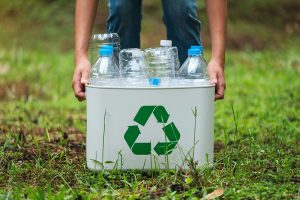
In the dynamic landscape of modern manufacturing, the mantra of “Reduce, Reuse, Recycle” is more than just a catchphrase – it’s a strategic approach that can revolutionize industrial processes. By incorporating these principles, manufacturers not only contribute to environmental sustainability but also stand to significantly reduce costs associated with industrial waste. In this article, we will explore creative ways manufacturers can implement the 3R’s to enhance their practices and make a positive impact on both their bottom line and the planet.
Reduce: Upgrading, Training, Tracking, and Sustainable Alternatives
 The first step in the waste reduction journey involves a comprehensive approach to minimizing the generation of industrial waste. Manufacturers can achieve this by upgrading their process equipment to more efficient and environmentally friendly models. A notable solution in this regard is the use of KenBay’s RotoPac industrial trash compactors, which offer an innovative way to compact and manage both standard and hazardous waste materials, optimizing both space and disposal efficiency. This not only streamlines waste management but also reduces the overall waste output.
The first step in the waste reduction journey involves a comprehensive approach to minimizing the generation of industrial waste. Manufacturers can achieve this by upgrading their process equipment to more efficient and environmentally friendly models. A notable solution in this regard is the use of KenBay’s RotoPac industrial trash compactors, which offer an innovative way to compact and manage both standard and hazardous waste materials, optimizing both space and disposal efficiency. This not only streamlines waste management but also reduces the overall waste output.
Additionally, investing in training programs for employees is crucial. Educating staff about waste reduction practices and the importance of resource conservation, combined with the knowledge and use of industrial trash compactors like the RotoPac, fosters a culture of responsibility and sustainability within the organization. Rigorous tracking of production processes allows manufacturers to identify areas where waste can be minimized or eliminated, and the incorporation of compactors facilitates efficient handling of the reduced waste volume.
Collaboration with suppliers is another key aspect of the reduction strategy. By working closely with suppliers, manufacturers can explore sustainable alternatives for raw materials and packaging, further mitigating the impact on the environment. This proactive approach, coupled with the use of industrial compactors, not only aligns with corporate social responsibility but also establishes a resilient supply chain that prioritizes sustainability.
Reuse: Switching to Reusable Materials
Emphasizing the benefits of reusability is a pivotal aspect of the 3R’s for manufacturers. Switching to reusable towels, absorbents, coveralls, and aprons can significantly decrease the volume of single-use materials in industrial processes. Reusable items not only reduce waste but also offer cost savings in the long run, as they eliminate the need for constant repurchasing.
Implementing a systematic approach to the reuse of materials involves assessing the durability and lifespan of products used in the manufacturing process. By opting for long-lasting and easily maintainable materials, manufacturers, supported by the efficiency of industrial compactors, can minimize the frequency of replacements, contributing to both waste reduction and cost efficiency.
Recycle: Partnerships, Waste Exchange Programs, and Company-Wide Initiatives
 Recycling is a cornerstone of sustainable manufacturing waste practices. Manufacturers can actively contribute to recycling efforts by developing key partnerships with recycling facilities and waste management organizations. These partnerships, combined with the use of industrial trash compactors like RotoPac, can streamline the recycling process and ensure that a significant portion of industrial waste is diverted from landfills.
Recycling is a cornerstone of sustainable manufacturing waste practices. Manufacturers can actively contribute to recycling efforts by developing key partnerships with recycling facilities and waste management organizations. These partnerships, combined with the use of industrial trash compactors like RotoPac, can streamline the recycling process and ensure that a significant portion of industrial waste is diverted from landfills.
Waste exchange programs present an innovative solution for manufacturers to repurpose waste materials within their industry or exchange them with other businesses for mutually beneficial uses. By finding alternative applications for waste materials, manufacturers, with the support of industrial compactors, can contribute to a circular economy that minimizes environmental impact.
Implementing company-wide recycling initiatives is essential for creating a culture of sustainability within the organization. This involves setting up dedicated recycling stations, providing education on proper waste disposal practices, and incentivizing employees to participate actively in recycling efforts. Companies can also explore the possibility of incorporating recycled materials into their production processes, closing the loop on resource use and complementing the efficiency of industrial trash compactors.
Conclusion: A Triple Win for Manufacturers
Incorporating the principles of the 3R’s, along with innovative solutions like KenBay’s RotoPac industrial trash compactors, is not just a responsibility but an opportunity for manufacturers to thrive in a sustainable and economically efficient manner. By reducing, reusing, and recycling, manufacturers can save money, improve operational efficiency, and contribute to the well-being of the environment. It’s a triple win that aligns with both ethical considerations and the demands of a conscientious consumer base. As the manufacturing industry evolves, embracing these creative waste reduction strategies, including the use of advanced compactors, will not only secure a competitive edge but also pave the way for a greener and more sustainable future.
For over two decades, KenBay has been a firm believer in the future of sustainable trash compaction. Our range of industrial RotoPac trash compactors is designed to meet the specific requirements of your company (for an additional fee, we offer customization options). Choosing our machines can have a direct and positive impact on your use of the 3R’s. If you’d like to explore enhanced waste management strategies for sustainability for your company, we encourage you to reach out to KenBay. Connect with us at 973-828-8081 to gain valuable insights into optimizing your environmental impact and adopting innovative waste management solutions.


